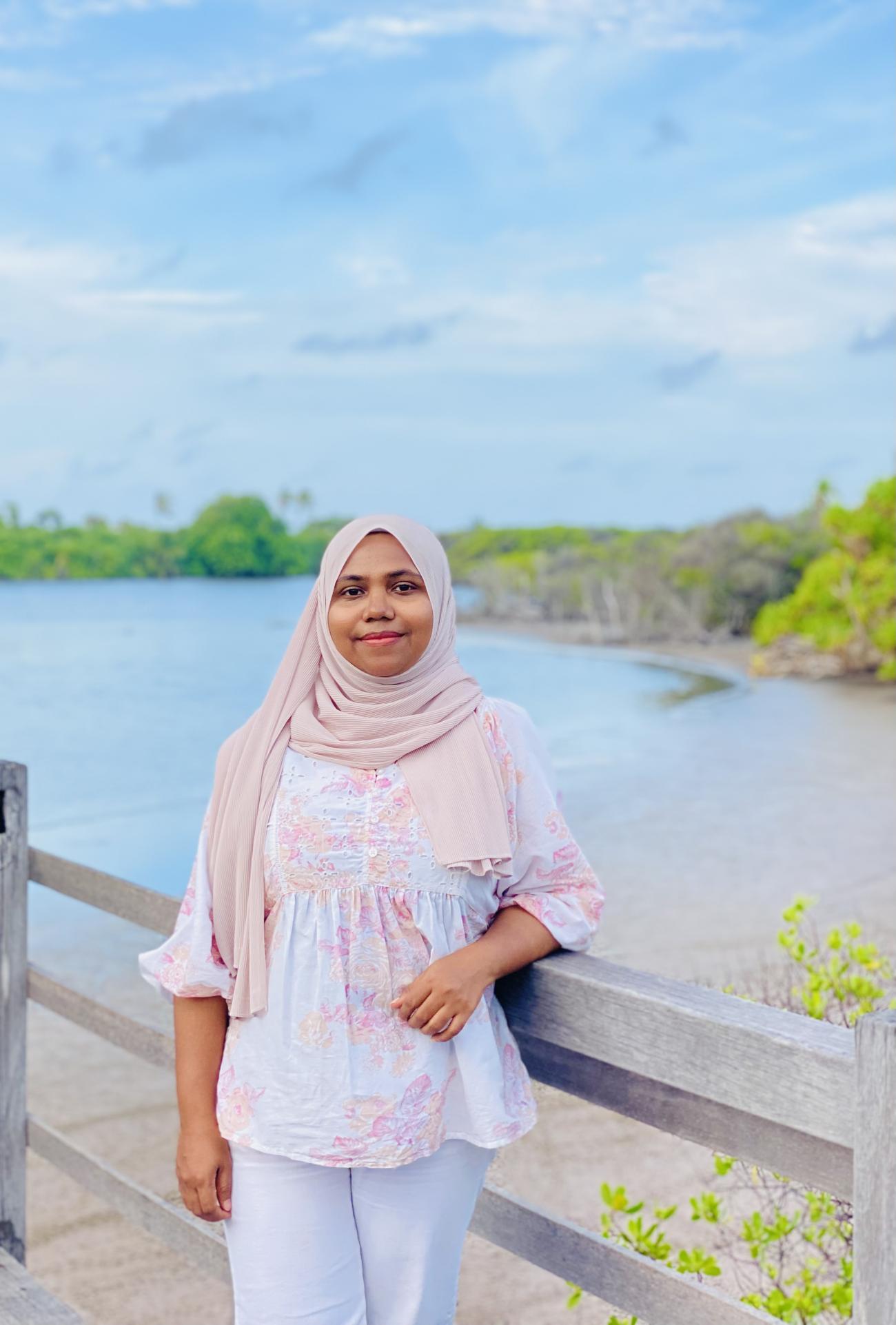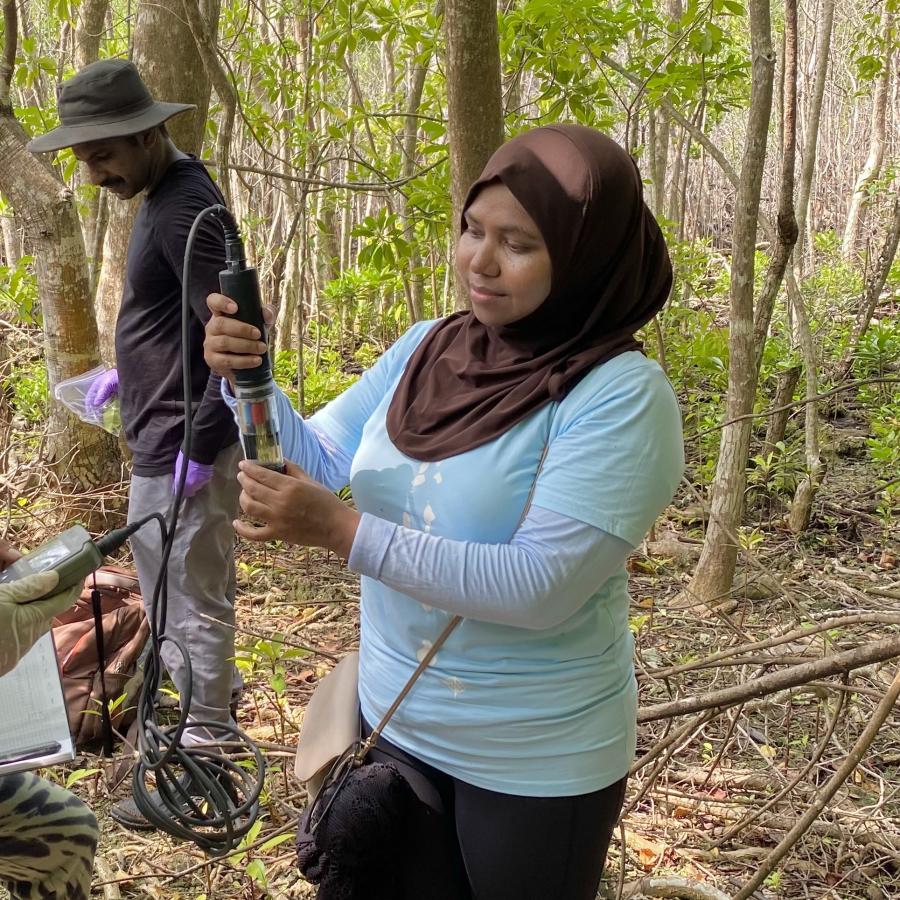Aishath Farhath (Fara) Ali, Wetland and Blue Carbon Researcher | Ecologist | Ornithologist | Writer | Proud Mother

On behalf of International Women's Day 2023, we bring to you the inspirational stories of women who are working in various fields.
As a child growing up in Feydhoo in Addu City of Maldives, Aishath Farhath (Fara) Ali used to visit the wetlands of Addu with her grandmother to harvest taro. The richness of the ecosystem always fascinated her, including the many species of birds present in the wetlands, as much as she was charmed by the white terns, dhondheenaas, breeding in her mango tree at home. This was where her passion for the environment and strong connection to conservation took root.
Many years later, her profession as an environmentalist working in the former Environment Research Centre of Maldives gave her the opportunity to work directly with island communities living adjacent to these same wetlands and mangroves and conduct research for the conservation of the many bird species of Maldives.
Fara had always had a passion to gain more knowledge in her field and develop her research in ecological surveying, biodiversity assessment and ornithological research.
After graduating from University of East Anglia in 2009, she headed a team of committed individuals who created a system for conservation of island ecosystems and species, which saw 'paper parks' progress to managed nature reserves and parks with trained park rangers and managers. Research needed for conservation and enforcement was developed, and the ever-increasing network of protected areas in the Maldives and more and more species which were endangered and at high risk of poaching got protected and managed.
A memorable moment in her conservation career was working as the Wetland Coordinator for a European Union funded project, which established the first wetland nature parks in the Maldives - Addu Nature Park and Fuvahmulah Nature Park. These nature parks paved the way for a new era in wetland conservation in the country, where communities benefited from eco-tourism. The boardwalks and the canoe rides through the mangroves changed the narrative of wetlands being considered as wastelands. People began to see their potential, especially in terms of how they could create economic benefits.
Working on her biodiversity and ecological research skills gave her the inspiration and courage to work with communities on a voluntary basis aside from her professional career. The NGO that she co-founded - Maldives Wetland Foundation, works to educate and inspire equally passionate people to actively work on wetland conservation with a vision for a healthy wetlands and mangrove ecosystems nationwide by offering wetland and mangrove island communities an opportunity to have a say and be involved in the socio-economic development decisions affecting their wetlands, and use the wetlands wisely.
Fara - a Director at the Ministry of Environment, Climate Change and Technology, and currently pursuing her PhD doing research on structural diversity of mangroves and its relation to environmental parameters - says technology has transformed how we investigate and conserve our biodiversity and environment.
An ecologist by profession with an active interest in ornithology, Fara conducts on the ground or field observations relying on technologies such as satellite transmitting technology or camera traps or acoustic monitoring devices.
If she is doing regulated research on seabirds, innovative technology such as ringing a bird or tagging a bird allows her to get the data on the migratory path which would be useful for the conservation of that species. In her research on mangrove species diversity in Maldives, she is using DNA barcoding - a technique which has transformed species identification. Her molecular research on mangrove species Bruguira Cylindrica, Kandoo, include studying the genetic variation of Kandoo along the islands of Boduthiladhunmathi Atoll. This would provide valuable genetic information for this species and would be helpful for the management and conservation of this species.
Fara is also working as the Project Manager for NGO FC Frigator from Haa Alif Hoarafushi Island, for a seabird research project funded under the Global Environment Facility (GEF) Small Grants Programme supported by the United Nations Development Programme (UNDP) in the Maldives, and in collaboration with British Antarctic Survey, to conserve the seabird colonies and roosting sites of lesser noddies, kurangi, in Ihavandhippolhu Atoll.
Fara considers this a noteworthy moment in her conservation career. Seabirds were tracked via satellite transmitters for the first time in Maldives to trace the little-known path of the migration of lesser noddies after they depart the country.The results of this research would be used to raise awareness on the importance of seabird populations in Maldives and on the ecological role of seabirds in island ecosystems, and to develop conservation measures for seabird management.
Fara’s dedication and hard work over the past 18 years have made her a leading voice in conservation and especially a champion for the protection of mangroves wetlands in the Maldives.
Fara is proud mother to three beautiful kids, who she considers the biggest blessings in her life along with her parents. She credits many of her successes to her parents and says that without their unwavering support she could not have achieved work-life balance as a single parent whose job involved a lot of field visits and travelling.
Having children of both genders, Fara considers there is no difference between them in terms of what the State and what she can provide for them – education, health wise and in almost everything. She also says that as a student, she has never experienced gender disparity between the genders. “Glass ceilings, gender imbalance, and patriarchy are terms we learn and experience from the work environment. As a woman, I want to have it all, be the best at parenting, and the career I want, and provide service to my country too. But the challenges are immense; the glass ceiling is so high,” Fara affirms.
“Careers in tech, data, and innovation and science fields are well paid fields. Women today should not hold back from earning an income and be self-sufficient, so I would say these fields have the prospect of advancing your careers and earning power. And moreover, the nation needs skilled people in these fields,” is Fara’s message to aspiring girls.
“Conserving and managing the most threatened, yet most beautiful ecosystems and species Maldives has to offer for now and for future generations is very worthwhile.”





